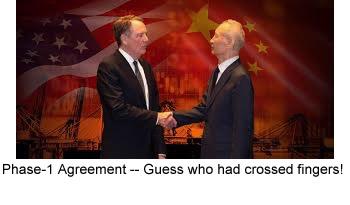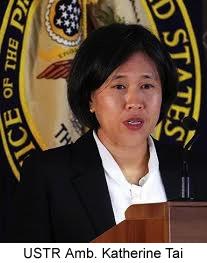The United States Trade Representative has submitted the “2021 Report To Congress On China WTO Compliance". The report emphasized the disregarding of WTO regulations and more specifically failure to satisfy obligations under the Phase-One Trade Agreement of January 2020 committing the Nation to importation of U.S. agricultural products.
 A principal deficiency in trade with China is the lack of meaningful action with respect to agricultural biotechnology. The January agreement established the need for a science-based system that has neither been developed nor implemented.
A principal deficiency in trade with China is the lack of meaningful action with respect to agricultural biotechnology. The January agreement established the need for a science-based system that has neither been developed nor implemented.
Market access for U.S. red meat exports have not materialized in volumes that were projected. Both beef and pork exports are constrained by the failure of China to accept administration of synthetic hormones legally used in the U.S. consistent with the standards of the Codex Alimentarius Commission. China agreed to establish maximum residue levels but has yet to publish values that would allow importation.
With respect to poultry, China agreed to regionalization in the event of outbreaks of catastrophic diseases. It remains to be seen when now confronted with H5N1 highly pathogenic avian influenza, in a number of states whether this policy will be followed. At present the major products imported from the U.S. comprise feet and edible byproducts.
 The USTR Report concluded, "China remains a difficult and unpredictable market for U.S. agricultural exporters largely because of the inconsistent enforcement of regulations and selective intervention in the market by China's regulatory authorities". The Report also states, "the inability or unwillingness of China's regulators to routinely follow science-based international standards and guidelines and to apply regulatory enforcement in a transparent manner in compliance with world trade organization rules impedes agricultural trade".
The USTR Report concluded, "China remains a difficult and unpredictable market for U.S. agricultural exporters largely because of the inconsistent enforcement of regulations and selective intervention in the market by China's regulatory authorities". The Report also states, "the inability or unwillingness of China's regulators to routinely follow science-based international standards and guidelines and to apply regulatory enforcement in a transparent manner in compliance with world trade organization rules impedes agricultural trade".
China willingly signs agreements but then interprets and implements them in a self-serving manner. China imports agricultural products and technology only when politically or financially expedient. Commercial considerations are subservient to the dictates of the Central government and ever-changing policy as interpreted by apparachiks.